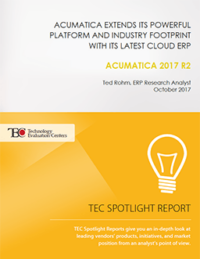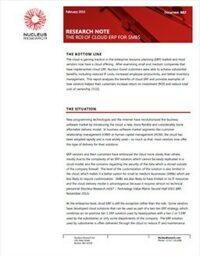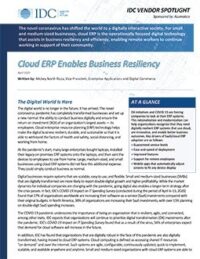Cloud ERP Software in Action
There are multiple use cases of businesses in all industries successfully completing a cloud ERP implementation. Let’s look at a few.
The manufacturing industry is dealing with unprecedented challenges, including the pandemic, supply chain issues, and offshoring (though reshoring is making an appearance). These circumstances require businesses to be agile. Companies that have implemented cloud ERP software have this agility. With a single, integrated solution and powerful inventory management, they can make decisions based on updated, accurate information. Business processes are automated and efficient, and the front office and shop floor can communicate quickly and easily.
Erickson International, a manufacturer and distributor of window films for multiple markets, also implemented Acumatica’s cloud ERP solution. CFO Elena Mheidze says, “If you are a midmarket business that desires to grow and has the need to unify your locations, Acumatica brings this amazing gain; it connects people. In today’s world, we need communication, and Acumatica provides the ability to have information at your fingertips that’s unified and delivered fast.”
For the retail and eCommerce industry, explosive growth—though good—has brought its own set of challenges. The pandemic forced many people to shop online, adding to those who already found online shopping a convenient option. Managing growth, fostering a consistent omnichannel commerce experience, and staying on top of commerce trends can be a full-time job. However, the load is lightened when businesses implement a cloud ERP solution. The system integrates with commerce software to connect every aspect of the business, from accounting and sales to inventory and fulfillment, offering a 360° view of the whole organization.
After implementing Acumatica’s cloud ERP software, Clive Coffee, a leader in the luxury home espresso market, has met the industry’s challenges head-on. CFO Amanda Datte says,
“The world is your oyster in terms of possibilities for efficiency and having seamless operations. We feel like we are prepared by using Acumatica for whatever the market has to offer.”
 Canada (English)
Canada (English)
 Colombia
Colombia
 Caribbean and Puerto Rico
Caribbean and Puerto Rico
 Ecuador
Ecuador
 India
India
 Indonesia
Indonesia
 Ireland
Ireland
 Malaysia
Malaysia
 Mexico
Mexico
 Panama
Panama
 Peru
Peru
 Philippines
Philippines
 Singapore
Singapore
 South Africa
South Africa
 Sri Lanka
Sri Lanka
 Thailand
Thailand
 United Kingdom
United Kingdom
 United States
United States




